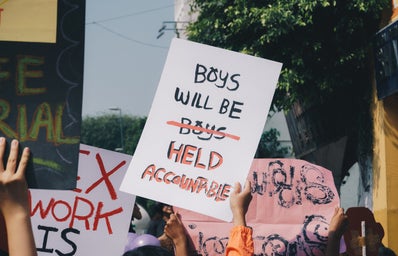I’m sure that the majority of us reading this piece right now are well aware of the various gender and social norms that are established in society. You might know them as the do’s or don’ts. Unfortunately, social constructs have yet to be deconstructed and continue to prevail. Who’s in authority to say what we as women and men can and cannot say, wear, or do? No one! Especially not any cis-gender man.
Today, I want to dig deeper into one specific string of a social construct: toxic masculinity. I could not wait to address this subject since I repeatedly observe external manifestations in my everyday life.
Let’s get into it.
To be sure we are on the same page, let me define toxic masculinity.
Toxic Masculinity (noun): a set of social norms that limits the emotions, actions, and character of men.
Exemplified, toxic masculinity is when we hear people say, “men don’t cry,” or the idea that men must be aggressive to get what they want (women in particular). We often see the representation of toxic masculinity in entertainment such as movies, television shows, the lyrics of hit music, etc.
In shorter terms, the media. Because the media has such an influence on the consumer, it’s effortless for boys or men to consume and internalize the damaging traits of this social construct.
Not only is toxic masculinity harmful to the mental health of men, but women also encounter unwanted effects. Due to increased influence, men walk around with their heads held high and their noses even higher.
Do you know how many times I have been rejected from a casual conversation with men (who are truly boys) because they carry this attitude of dominance? Too many!
I could not believe my experiences to be true. All I could think was the nerve of him. The realization that they were attempting to maintain the look of hardness struck me.
It was not me; it was him.
Men, especially in generation z, seem to thrive off of the idea of being the cool guy, the ‘IT’ man. With that said, men often choose to comprise themselves with a lack of empathy, hyper-competitiveness, sexual aggression, and control.
While they’re so busy trying to keep up with the tempo, they fail to realize that there are women like me, who are sensible and know that the act is deceptive.
“Boys will be boys.”
“The manlier he is, the better.”
“Toughen up.”
I hate to break it to you: in my book, you are not more socially qualified by your ‘manly’ traits. Choosing to be anything other than your authentic self does not boost your cool points. As a matter of fact, it diminishes your individuality. These days your creativity, ability to be personable, and willingness to incite your emotions are what catch the eye.
The best way to end this patriarchy is if the community of men begins to be honest with themselves, hold one another accountable, and promote the end of this construct. If they do not establish change themselves, it’ll be challenging to bring about any progression. Social constructs, such as this one, only exist because we as humans have decided to take them on and incorporate them into our society. Hence, we as a people are the ones who can deconstruct.
We’ve enabled the creation of a monster that only we have the capability to destroy. But until then, my advice to whoever is reading this (man or woman): Spread awareness. Fast.
Nice guys do not finish last, remember that.


